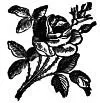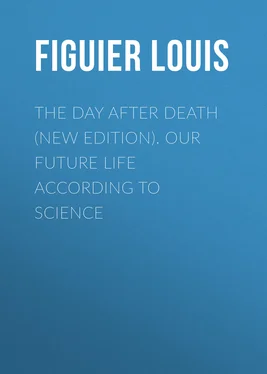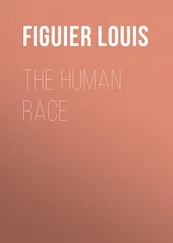Louis Figuier - The Day After Death (New Edition). Our Future Life According to Science
Здесь есть возможность читать онлайн «Louis Figuier - The Day After Death (New Edition). Our Future Life According to Science» — ознакомительный отрывок электронной книги совершенно бесплатно, а после прочтения отрывка купить полную версию. В некоторых случаях можно слушать аудио, скачать через торрент в формате fb2 и присутствует краткое содержание. Жанр: Эзотерика, foreign_religion, foreign_antique, foreign_prose, на английском языке. Описание произведения, (предисловие) а так же отзывы посетителей доступны на портале библиотеки ЛибКат.
- Название:The Day After Death (New Edition). Our Future Life According to Science
- Автор:
- Жанр:
- Год:неизвестен
- ISBN:нет данных
- Рейтинг книги:5 / 5. Голосов: 1
-
Избранное:Добавить в избранное
- Отзывы:
-
Ваша оценка:
- 100
- 1
- 2
- 3
- 4
- 5
The Day After Death (New Edition). Our Future Life According to Science: краткое содержание, описание и аннотация
Предлагаем к чтению аннотацию, описание, краткое содержание или предисловие (зависит от того, что написал сам автор книги «The Day After Death (New Edition). Our Future Life According to Science»). Если вы не нашли необходимую информацию о книге — напишите в комментариях, мы постараемся отыскать её.
The Day After Death (New Edition). Our Future Life According to Science — читать онлайн ознакомительный отрывок
Ниже представлен текст книги, разбитый по страницам. Система сохранения места последней прочитанной страницы, позволяет с удобством читать онлайн бесплатно книгу «The Day After Death (New Edition). Our Future Life According to Science», без необходимости каждый раз заново искать на чём Вы остановились. Поставьте закладку, и сможете в любой момент перейти на страницу, на которой закончили чтение.
Интервал:
Закладка:
A great number of living beings can therefore exist where we see nothing, and it is feasible to science to open the eyes of the multitude in this respect.
We desire to assume the position of the naturalist of whom we have spoken. Between man and God, the ignorant crowd and a blind philosophy perceive nothing; but, when we replace the eyes of the body by those of the spirit, that is to say, when we make use of reason, analogy, and education, these mysterious beings come to light.
We have already, in studying the superhuman being, described one of those intermediate creations between man and the divinity, and defined the existence of one of those landmarks placed by nature on the high-road of infinite space. But the ladder does not break off at its first step, and we are convinced that numerous living hierarchies intervene between the superhuman being and the radiant throne of the Almighty. We have said elsewhere, that, in our belief, superhuman beings are mortal. What becomes of them after their death? Let us now take up the thread of our deductions.
We believe that—the superhuman being having died at the end of a term whose duration we have no means of knowing—his soul, perfected by the exercise of the new faculties which it has received, and the new senses with which it has been endowed, enters into a new body, provided with senses still more numerous and more exquisite, and endowed with faculties of still greater power, and thus commences a fresh existence.
We call the being who succeeds to man angel , or superhuman; we may call his succession in the ethereal realm, arch-angel , or arch-human .
The actual moment of the passage from one life to another, must be, as it is in the case of man, a time of moral and physical pain. The supreme periods at which a metamorphosis takes place in a sensible being are crises full of anguish and torment.
We will not endeavour to penetrate the secrets of the organization of the new being whose existence we thus trace, and who is superior to the superhuman being in the natural hierarchy; because our means of investigation fail us at this point. We have ventured to form some conjecture respecting the body, the soul, and the life of the superhuman being, because in that case, however adventurous our excursion into unknown spheres, we had a point of comparison and induction in the human species. But all induction respecting the arch-human being who succeeds the superhuman, is wanting, for we could only perceive the latter by means of conjectures and analogies which we must not carry farther.
We will, therefore, abstain from pursuing this kind of investigation, permitting the reader to exercise his own imagination upon the form of the body, the number and perfection of the senses, and the extent of the faculties of the happy creature who succeeds to the superhuman being, and who dwells, like him, in the immensity of ethereal space. We will only add that we do not think a second, a third, or a fourth incarnation arrests the succession of the chain of sublime creations, which float in the infinitude of the heavens, and which proceed from a primitive human soul, which has grown in perfection and in moral power. It surpasses our faculty to define, by the unassisted light of our reason and our knowledge, the number of these beings who go on succeeding one another in ever-increasing perfection. We can only say that we believe the creatures, which compose this ladder of perfections in succession, must be very numerous.
At every stage of his promotion in the hierarchy of nature the celestial being beholds the growth of those wings which symbolize his marvellous power to us. Each time his organs become more numerous, more flexible, have greater scope. He acquires new and exquisite senses. He acquires more and more power of extending his beneficent empire, of exercising his faculty of loving his fellows and all nature, and, above all, of comprehending and reading the designs of God. Deeper and deeper affections engage his soul, for the tenderness and the happiness engendered in its pure satisfaction, are granted to him to console him for the sufferings of death, to which he is always condemned. It is thus that the happiness of the elect is augmented. It is thus that the beings who inhabit the boundless plains of the invisible world employ each of their lives in preparing for the life which is to follow, in securing by a wise exercise of their freedom, industrious culture of their faculties, strict observance of morality, and continuous beneficence, a more noble, more animated, and happier destiny in the new spaces which await them, in the development of their sublime destiny. 4 4 On this subject see the book of Dupont de Nemours, " Philosophie de l'Univers ," quoted by M. Pezzani in his " Pluralité des existences de l'âme ," pp. 216-218.
Nevertheless, as everything comes to an end in this world, so must everything have an end in the surrounding spheres. After having traversed the successive stages and rested in the successive stations of their journey through the skies, the beings whom we are considering must finally reach a defined place. What is this place, the ultimate term of their immense cycle across the spaces? In our belief, it is the sun.

CHAPTER THE SEVENTH
ACCORDING to our system of thought the sun is the central place in which souls which come from the ethereal spaces are finally gathered together. After having undergone the successive incarnations which we have described, souls, primitively human, finish by reaching the sun, by dwelling within the borders of the star-king.
This, then, is a fitting place for a description of the sun from the physical and astronomical point of view. Such a description will at once reveal the entirely sovereign part played by that globe which has no fellow. The astonishing attributes which belong to it, the unimaginable power which it wields, will sufficiently explain the place at the summit of the ascending scale of nature, which we assign to the sun.
In the first place, the sun is totally different from the other stars of our world. He resembles nothing, and nothing can be compared with him. Neither planets, satellites, asteroids, nor comets can give us any idea of him. His immense volume, his physical constitution, his exceptional properties place him in a totally separate rank, and afford full justification to those who claim for him a separate and sovereign place.
The enormous mass of the sun at once proclaims his supremacy. The sun is sufficiently vast to receive everything which could come to him from all the other planets. He surpasses in volume the united size of all the celestial bodies which revolve around him. He is six hundred times larger than the entire assemblage of the planets with their satellites, of the asteroids and the comets which compose what is called the solar world; that is to say, the world of which we form a part. The proportion in which the sun exceeds the earth in volume is, then, necessarily enormous; since he is larger than all the other stars put together. He is one million three hundred thousand times larger than our globe.
It is only by drawing that we can give an exact idea of the comparative sizes of the sun and the other planets. The reader will find in the accompanying illustration (Fig. 1) a figure which exactly represents the comparative dimensions of the sun, and the largest planets of our world. The earth, represented by a dot, gives an idea of what Mars, Mercury, and Venus, which are smaller than the earth, must be.
It takes three years to circumnavigate the earth. To circumnavigate the solar globe, under similar conditions, would take three hundred years. If human life be not more prolonged in the sun than on the earth, an existence would not suffice to enable a traveller to become acquainted with the surface of the globe he inhabits.
Читать дальшеИнтервал:
Закладка:
Похожие книги на «The Day After Death (New Edition). Our Future Life According to Science»
Представляем Вашему вниманию похожие книги на «The Day After Death (New Edition). Our Future Life According to Science» списком для выбора. Мы отобрали схожую по названию и смыслу литературу в надежде предоставить читателям больше вариантов отыскать новые, интересные, ещё непрочитанные произведения.
Обсуждение, отзывы о книге «The Day After Death (New Edition). Our Future Life According to Science» и просто собственные мнения читателей. Оставьте ваши комментарии, напишите, что Вы думаете о произведении, его смысле или главных героях. Укажите что конкретно понравилось, а что нет, и почему Вы так считаете.












